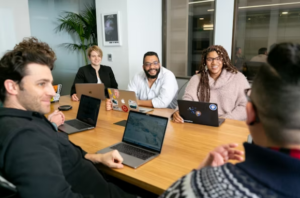Investigating Professional Expectations

This page provides general information about a learning activity that’s common in many Educational Planning courses.
Since educational planning course content depends on the mentor/advisor and the student, understand that your course may have different and/or specific expectations related to this topic.
Professional Expectations and Educational Planning
You may be pursuing a degree for professional purposes, to advance at work, to change to a new job, to affirm the years of professional knowledge that you’ve gained. A common investigation in planning an individualized degree is to research what’s expected professionally, both generally in the contemporary workforce and specifically for your profession. You use the results of your investigations to help choose course work that will advance needed knowledge and skills for your profession.
General Knowledge for the Contemporary Workforce
In 2018, four years before ChatGPT was released, a group researching the future of work stated that:

Workers in the future will need what they call “Human + Skills,” or skills that differentiate us from intelligent machines and make us more human….These are skills that enable learners to transfer their knowledge from domain to domain in the face of job obsolescence and to learn new skills in demand. Human skills are in high demand across many industries and include skills such as leadership, collaboration, creativity, critical thinking, communication, emotional intelligence, judgment, ethics, and cognitive flexibility.” [1]
A focus on human skills is not enough, though. “It is the integration of human and technical skills that will provide the best preparation for the future of work.” [2]

A more recent article in Forbes confirms this prediction. It lists strategic thinking, communication, honesty and integrity, critical thinking, and adaptability as key skills that professionals need. [3]
Research “top workforce skills” and you’ll get similar information. Although current sources differ slightly in their lists of important workforce skills, most of them emphasize abstract, cross-functional, and cross-disciplinary skills, citing the rapidly changing nature of work, the rise of AI, and a longer human work life resulting in many job changes, as reasons to focus on skills such as these.

As you plan your degree, consider current research on general workforce skills. You might want to further assess your own skills in areas such as communication, teamwork, resilience, integrity, or creative/critical thinking and plan how to incorporate studies that support these competencies in your degree.
Specific Knowledge for your Profession
Specific knowledge and skills are needed for particular professions. For example, accountants and psychologists both need to understand statistics, since the professions use statistical information regularly. Healthcare professionals in certain fields may need to understand health informatics, while professionals in the field of workforce training need to understand learning theories.

Investigating specific knowledge and skills may be an important part of educational planning for you, if you’re designing a professionally focused degree.
There are multiple questions to consider, such as:
- What particular knowledge and/or type of degree does the profession expect college graduates in this field to have?
- What specific skills are important in the profession?
- How is the field expected to develop in the future?
- What courses seem to offer the most preparation for advancement in the field, given the field’s proposed future direction?
As you plan your degree, you may want to research specific knowledge and skills for your profession in addition to general workforce skills.
Certifications/Advanced Professional Degrees
Some fields, such as accounting, have very specific knowledge and skills requirements to prepare to sit for the CPA exam.

Some graduate programs, such as a Master’s in Social Work, may require preparatory undergraduate coursework in human development, biology, and/or psychology, among other areas. If you don’t have those courses in your bachelor’s degree, they will require you to take them before applying.
The point here is that you may want to work “backwards,” if you already are aware of your next step professionally. Investigate that next step—whether it’s advanced professional certification or an advanced professional degree—and see what knowledge expectations and requirements you can address in the degree you’re planning at ESU.
Researching Professional Expectations – Some Useful Resources
Occupational Outlook Handbook – Published by the U.S. Department of Labor’s Bureau of Labor Statistics, this resource contains information on “duties, education and training, pay, and outlook for hundreds of occupations.”
O*NET OnLine – This resource allows you to search professions in a number of different ways. A basic search of professions provides information on expected tasks and skills. An advanced search allows you to search by particular tasks and skills.
Monster.com – This site contains information about types of careers and covers career duties and education needed for specific careers.
Current Practitioners – Ask questions such as:
- What general skills do you need to use on a daily basis, and what general skills do you need to advance?
- In retrospect, what particular knowledge from college courses have you found most useful to practicing your profession effectively?
- What sources of information do you use to stay current in the field?
- What are the legal requirements, examinations, or certifications, if any, expected for entry into or advancement in the profession?
Key Takeaway – Looking Forward
You will eventually explain your research into professional expectations – and how that research informed your course choices – in the rationale essay that accompanies your degree plan, if you are planning a degree that you intend to use for professional purposes.
- Robot-Ready: Human + Skills for the Future of Work. Authored by: Michelle R. Weise, Andrew R. Hanson, Rob Sentz, Yustina Saleh. Provided by: Strada Institute & Emsi. Located at: https://www.economicmodeling.com/wp-content/uploads/2018/11/Robot-Ready_Report_Single.pdf. License: CC BY-NC-SA: Attribution-NonCommercial-ShareAlike ↵
- ibid. ↵
- Castrillon, Caroline (Jan. 19, 2025). "5 Soft Skills That Are Critical In The Age of AI." Forbes. https://www.forbes.com/sites/carolinecastrillon/2025/01/19/5-soft-skills-critical-in-the-age-of-ai/ ↵
